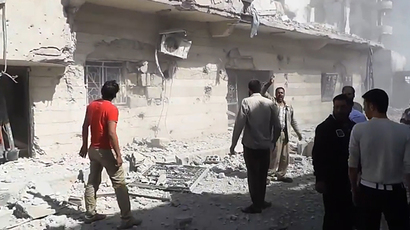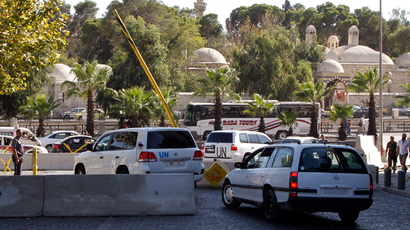Rebels blast gas pipeline near Damascus causing southern Syria blackout
A gas pipeline was attacked near Damascus causing the capital and the southern part of Syria to suffer a blackout. The electricity minister blamed the blast on rebels.
"A terrorist attack on a gas pipeline that feeds a power station in the south has led to a power outage in the provinces, and work to repair it is in progress," electricity minister Emad Khamis told SANA news agency.
As the pipeline is located near Damascus International Airport, which is some 20 km away from the capital, a power outage also hit Damascus.
RT’s Arabic correspondent in Syria Abutalib Albouhaya has confirmed the power was out in the capital after the gas supply to Tashrin power plant was cut. Albouhaya also said there were several victims near a church in Dummar suburb of Damascus with gunfights going on in Qaboun and Mleha suburbs as well.
BREAKING - Church bombed in suburb of #Dumar#Syria - reports of casualties / fighting in suburbs
— PaulaSlier_RT (@PaulaSlier_RT) October 23, 2013
It is not immediately clear how extensive the blackout is in the rest of the country. The minister said maintenance crews are working to restore power. In September, a similar outage was caused after a high voltage power line was sabotaged, AFP reports.
Media reports say the capital city of Damascus is covered with thick smoke and shell explosions are being heard.
"The whole city just went dark," Reuters cited a resident who lives in the center of the city. A woman, who asked to remain anonymous, said she saw the "major glow of a fire" near Damascus International Airport and heard the sound of heavy machinegun fire.
The UK-based Syrian Observatory for Human Rights claimed the explosion was caused by rebel artillery as they were targeting the town of Ghasula several miles from the airport, Reuters reports. The observatory also suggested that the attack was a pre-planned large scale operation.
This attack could now be used by the opposition as yet another “justification for calling off plans for talks, which is an exact opposite of what it is,” anti-war activist David Swanson told RT.
“When you are proposing to discuss an end to violence, an increase in violence is all the more reason to proceed with all the more deliberation to make it happen,” Swanson said. “But that is of course the danger as particularly the opposition side in Syria does not want to have these talks unless unreasonable conditions are set beforehand.”
On Tuesday, during the Friends of Syria group meeting in London, Syrian opposition once again reiterated their conditions for participation in Geneva-2 peace talks. Opposition National Coalition chief Ahmad Jarba said that they would not attend the peace conference unless its main objective was to remove Assad from power.
“There will not be any negotiations at all without making sure that the Geneva 2 meeting is basically for the transitional period and for Assad to go," Jarba said, adding however that his group would convene again to make a final decision on their attendance.
Russia and the US have been pushing to hold the Syria peace conference since May. According to the Arab League chief, the gathering may finally start on November 23. However, so far no firm date has been set.














